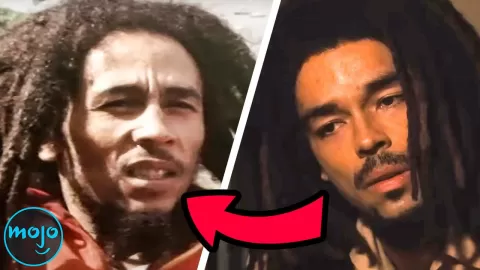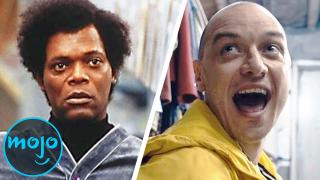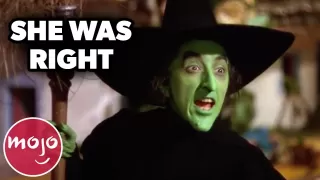Top 10 Things We Discovered About Bob Marley From Watching One Love

#10: The Impact of Bob Marley’s Music
Top 10 Things Bob Marley One Love Gets Factually Right and Wrong
“Get Up, Stand Up,” “I Shot the Sheriff,” and “Redemption Song” are just some of the hits featured in “One Love.” Even if you were already familiar with Marley’s songs, you might’ve underestimated their cultural impact upon release. Not only did he bring reggae to a wider audience. He sought to spread a universal message of peace. Beyond Marley’s life, the film shines a light on the Jamaican political conflict, which has been ongoing for over 80 years. While Marley didn’t resolve the conflict, he did help to ease tensions between the right and left through concerts like Smile Jamaica and One Love. “Let’s get together and feel alright” sounds like a simple lyric. Knowing Marley’s political background, though, it takes on a deeper meaning.
#9: Bob Marley’s Introduction to Rastafarianism
Top 5 Things to Know About Love and Monsters
While we’re only given glimpses of Marley’s upbringing, these flashbacks touch upon crucial turning points that shaped the reggae superstar. Through Marley’s courtship with his future wife Rita, we see how he came to adopt Rastafarianism as his religion. Although Marley was brought up Catholic, he became increasingly drawn to Rastafari during his time in Jamaica. Marley signified his conversion with the growth of his dreadlocks. Other than Emperor of Ethiopia Haile Selassie I, few Rastafarians have done more to spread the movement’s message than Marley. As depicted in “One Love,” much of Marley’s music is rooted in Rastafari beliefs. Religion and faith are two of the key themes behind Marley’s album “Exodus,” the titular single drawing parallels between Rastafarians and Moses freeing the Israelites.
#8: Going to Africa Was Important to Marley
Top 10 Things What’s Love Got to Do With It Got Factually Right & Wrong
Much of “One Love” revolves around Marley’s European tour, although the singer repeatedly asserts that he wants to drop by Africa. Marley strongly supported Pan-Africanism, a political movement that encourages the unity of Africa’s indigenous peoples. While Marley sought to share this message with a global audience, he also recognized the importance of bringing it directly to Africa. Since the film’s third act primarily focuses on the One Love Peace Concert in Jamaica, Marley’s subsequent trip to Africa isn’t explored in great depth. That said, Marley did fulfill his goal, visiting Ethiopia, Kenya, and several other African countries throughout his final years. During this time, he released the album “Survival” with songs like “Africa Unite” embodying his stance on solidarity.
#7: The Tension Between Marley & Don Taylor
Top 10 Things to Remember Before Seeing Thor Love and Thunder
Aside from Bob Marley, this biopic spotlights lesser-known figures behind the legend. Among them is his manager Don Taylor, who got shot with Marley and two others during an assassination attempt. Taylor survived, although his professional relationship with Marley was in store for another brutal confrontation. As “One Love” suggests, a financial dispute prompted Marley to physically attack Taylor. In the film, the fight is defused quickly with Rita and several others holding Bob back. Based on firsthand accounts, though, the aftermath entailed hours of interrogations and threats. Talor wasn’t as easily forgiven as the film implies either. The timing of the incident is slightly off as well, but the film ultimately gets to the center of where this partnership took a bitter turn.
#6: Marley’s Exile to England
Following the attempt on his life, Marley showed Jamaica that he couldn’t be so easily broken. Marley didn’t turn his back on Jamaica, but with his life in jeopardy, he was compelled to leave his home country for a period. He’d spend the next two years in England where he recorded “Exodus,” which played an instrumental role in building a bridge between reggae and the UK. Although not featured in the film, it was during his voluntary exile that Marley also recorded the album “Kaya.” Aside from his music, “One Love” explores how the move to England affected Marley’s personal life. Marley was separated from his children throughout his stay and while Rita eventually joined him in England, the marriage wasn’t without hurdles to overcome.
#5: Marley Was Half White
Although Marley’s father is portrayed as an enigmatic figure, the audience can immediately tell that he’s Caucasian. We see Marley’s father walk out on his son and mother, never to be seen again. That is except for a few dream sequences in a burning field where a young Marley crosses paths with a white man (presumably his father). While these visions might take artistic liberties, they capture how Marley knew little about his father aside from a photo of him on a horse. Brought up by his Black mother, Marley was taunted by others in the neighborhood for having lighter skin. This further motivated Marley to unite people, saying, “I’m not on the white man’s side, or the Black man’s side. I’m on God’s side.”
#4: The Marleys Had Extramarital Affairs
Top 5 Thing You Need to Remember Before Watching Glass
As distance grows between Bob and Rita in the film, it’s revealed that both have been unfaithful. “One Love” admittedly doesn’t provide the whole picture. While it’s been debated how many children Bob Marley had, eleven have been officially acknowledged. He only conceived three of them with Rita. Bob also adopted two of Rita’s daughters, one from a previous relationship and the other from an extramarital affair. Meanwhile, Bob had six more children with six other women while married to Rita. Even if the film doesn’t get into the specifics of the Marleys’ adultery, it does highlight how their marriage persevered. They might not have always been loyal to each other, but Bob and Rita remained together until the end for a reason.
#3: How Marley Discovered His Cancer
Top 10 Things Only Adults Notice in The Wizard of Oz
The audience can tell that Marley’s gnarly toe is more than a standard soccer injury. It still comes as a surprise to the viewer - not to mention Marley - when he’s diagnosed with a rare form of melanoma. Indeed, what seemed like a minor blemish turned out to be something much bigger that ultimately cost Marley his life. Beyond a mention of his passing during the epilogue, “One Love” doesn’t delve into what happened after the diagnosis. Namely, Marley had his nail and nail bed removed, which seemingly took care of the cancer at first. Little did Marley realize that the cancer spread with subsequent treatments proving unsuccessful. This film is more about how Marley lived, but it doesn’t tiptoe around the moment that changed everything.
#2: Marley’s Assassination Attempt
Considering how young Marley was when died, one might assume that his assassins were successful. While Marley did take multiple bullets, he survived the raid on his home. So did Louis Griffiths, Don Taylor, and Rita Marley, all of whom were hit as well. Despite being surrounded by several gunmen, nobody was killed. Rita’s survival was especially miraculous with her dreadlocks preventing the bullet from entering her brain. You can’t exactly say that they dodged a bullet, but this was the closest of close calls. The film does take one major liberty with Bob Marley later meeting and forgiving his shooter, which never happened. As for the attempt itself, though, “One Love” authentically recreates arguably the most horrifying moment in Marley’s life.
#1: Marley Performed Two Days After Being Shot
There’s little doubt that the assassination attempt on Marley was linked to the Smile Jamaica Concert, which was set to take place two days later. Although Marley was physically well enough to perform, going in front of an audience of 80,000 for 90 minutes still came with a substantial risk. Regardless, Marley knew that if he backed out, his attackers would’ve succeeded at least to some degree. Rita proved resilient in the face of violence and repression as well, going from the hospital to the concert where she performed with her husband. It took more than a bullet to stop Marley and even with illness cutting his life short, cancer couldn’t prevent his spirit from living on through his music.
Do you know any interesting facts about “Bob Marley” that the film left out? Share them in the comments.







